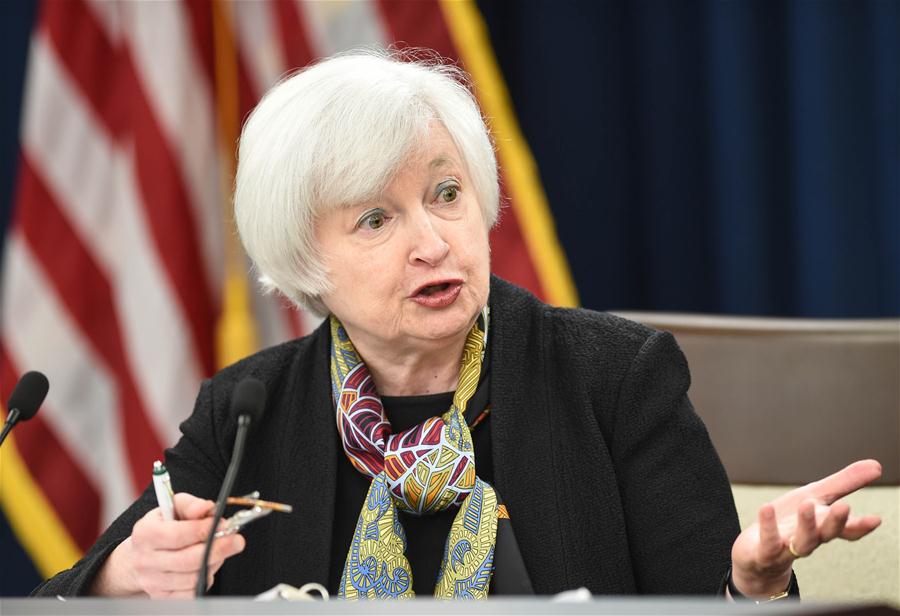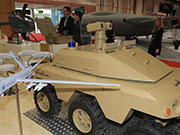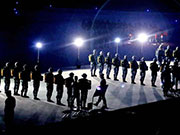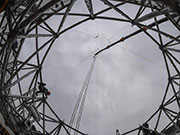


U.S. Federal Reserve Chair Janet Yellen speaks during a news conference in Washington D.C., capital of the United States, March 16, 2016. The U.S. Federal Reserve on Wednesday kept its benchmark short-term interest rates unchanged as widely expected, noting that "global economic and financial developments continue to pose risks" to the U.S. economy. (Xinhua/Bao Dandan)
WASHINGTON, March 16 -- The U.S. Federal Reserve on Wednesday kept its benchmark short-term interest rates unchanged as widely expected, noting that "global economic and financial developments continue to pose risks" to the U.S. economy.
The Fed raised its target range for the federal funds rate by 25 basis points to 0.25-0.5 percent in December, the first rate hike in nearly a decade, marking the end of an era of extraordinary easing monetary policy.
But the turmoil in financial markets and a slowdown in global economy since the start of the year has raised increasing concerns about the strength of the U.S. economy, forcing Fed policymakers to hold off on any further rate hikes since.
In its January policy statement, the Fed declined to make a judgement about the balance of risks to the U.S. economy, an indication of the uncertainty about the impact of global economic and financial turbulence on the world's largest economy.
In a statement released Wednesday after a two-day policy meeting, the Fed said U.S. "economic activity has been expanding at a moderate pace despite global economic and financial developments in recent months," but these developments continue to pose risks.
The changes in the statement on risks signaled that Fed officials are inclined to wait for more time to assess the U.S. economic outlook before raising interest rate again.
"We should not take the strength in the U.S. labor market and consumption for granted," Fed governor Lael Brainard said in a speech earlier this month. "From a risk-management perspective, this argues for patience as the outlook becomes clearer."
About 76 percent of the business and academic economists said the Fed would wait until June to raise interest rates, while some 6 percent of economists predicted the central bank would increase interest rates in April, the latest survey conducted by the Wall Street Journal indicated.
The Fed's updated projections released Wednesday showed that policymakers expected the federal funds rate to rise to around 0.9 percent at the end of 2016, implying two quarter-percentage-point rate increases this year, down from four estimated in December.
"Most participants (Fed officials) do continue to envision that if economic developments unfold as they expect that further increases in the federal funds rate will prove appropriate over time," Fed Chair Janet Yellen said Wednesday at a press conference after the policy meeting, indicating the central bank is still on track to raise interest rates later this year.
The central bank's baseline expectations for U.S. economic activity, the labor market and inflation "have not changed much since December," with this year's economic growth forecast slightly downgraded to 2.2 percent from 2.4 percent predicted in December, Yellen said.
"Economic conditions will evolve in a manner that will warrant only gradual increases in the federal funds rate," Yellen said, but emphasizing that monetary policy is "not on a pre-set course."
Day|Week

 Beijing steps up security for 'two sessions'
Beijing steps up security for 'two sessions' Chongqing sniper’s new record: 13 holes on a rice grain
Chongqing sniper’s new record: 13 holes on a rice grain Women put on spring dresses in Hangzhou
Women put on spring dresses in Hangzhou UAVs at Unmanned Systems Exhibition & Conference in UAE
UAVs at Unmanned Systems Exhibition & Conference in UAE PLA's paratroopers conduct night training
PLA's paratroopers conduct night training Three new-type tank landing ships join the East China Sea Fleet
Three new-type tank landing ships join the East China Sea Fleet 3,492 reflector panels of China's mega telescope installed
3,492 reflector panels of China's mega telescope installed Stunning Kuche on the Silk Road
Stunning Kuche on the Silk Road Tunisian man creates art of sand in Hangzhou
Tunisian man creates art of sand in Hangzhou Goddess teacher shares fitness program online
Goddess teacher shares fitness program online